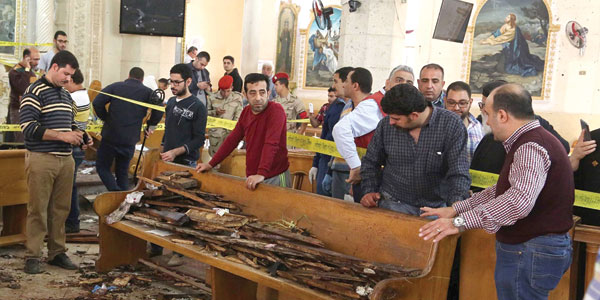
Compiled From News Reports
Perpetrators not identified, but ISIS believed to be responsible
The Islamic State (ISIS) may have perpetrated another terrorist attack.
As multiple news agencies have reported, a terrorist attack was carried out on Nov. 24 at a mosque in Egypt in North Sinai, a section of the Sinai Peninsula. At press time Wednesday (Nov. 29), the death toll was at 305, with the injury total at 128.
And at press time, no terrorist group had been identified or come forward as the perpetrator. However, NBC News and other sources have suggested ISIS was responsible.
ISIS is believed to have been responsible based partly on the scale of the attack, which reportedly involved multiple types of weaponry, including rocket-propelled grenades, machine guns and a bomb. In addition, as news agencies have reported, investigating authorities claim the attacking group included ISIS flag-bearers. Moreover, the victims were Sufi Muslims. As the website Vox.com and other news sources have mentioned, ISIS strongly opposes Sufism.
In related news, human rights activist Mohamed Soltan spoke with CBS News about ISIS’ push in the Sinai Peninsula to draw more followers to its cause. Soltan, who was a political prisoner for almost two years in Egypt, tied the growth of ISIS in Egypt and the terrorist attacks during the past few years in Sinai to Abdel Fattah al-Sisi’s presidency over the Middle Eastern country.
“Egypt under Sisi has, literally, become quite the black hole for human rights, democratic governance and rule of law,” Soltan said.
That environment, in turn, has created what Soltan called “fertile ground” for violent radicals to take root in Egypt. Soltan said he saw radicals attempting to recruit inmates while he was imprisoned.
“Some Sinai recruiters, when I was on hunger strike, they would be … allowed in my room to talk to me about how … non-violent resistance doesn’t work, how the U.S. government has basically sold me out and has continued to … embrace this dictator who is imprisoning me and my father and my journalist friends,” he stated.
But as news agencies have reported, Sisi has authorized air attacks on sites suspected to be locations connected with carrying out the mosque attack. According to Reuters and the British Broadcasting Corp., he’s giving the Egyptian military a three-month time frame for securing peace in the Sinai Peninsula.
Cientos de muertos y heridos en un ataque terrorista en Egipto
Los autores no han sido identificados, pero se cree que el ISIS es responsable
El Estado Islámico (ISIS) puede haber sido el autor de otro ataque terrorista.
Como han informado varios medios de comunicación, se llevó a cabo un ataque terrorista el 24 de noviembre en una mezquita en Egipto en el norte del Sinaí, una sección de la península del Sinaí. Al cierre de esta edición el miércoles (29 de noviembre), el número de muertos fue de 305, con un total de 128 lesionados.
Hasta el cierre de esta edición, ningún grupo terrorista había sido identificado o presentado como el responsable. Sin embargo, NBC News y otros medios han sugerido que ISIS era el autor.
Se cree que ISIS fue responsable en parte por la escala del ataque, que supuestamente involucró múltiples tipos de armamento, incluyendo granadas propulsadas por cohetes, ametralladoras y una bomba. Además, como informaron los medios de comunicación, las autoridades investigadoras afirman que el grupo atacante incluyó a los portavoces del ISIS. Adicionalmente, las víctimas eran musulmanes sufíes. Como el sitio web Vox.com y otras fuentes de noticias han mencionado, ISIS se opone firmemente al sufismo.
En noticias relacionadas, el activista de derechos humanos Mohamed Soltan habló con CBS News sobre el impulso de ISIS en la Península del Sinaí para atraer más seguidores a su causa. Soltan, que fue prisionero político durante casi dos años en Egipto, vinculó el crecimiento del ISIS en Egipto y los ataques terroristas durante los últimos años en el Sinaí a la presidencia de Abdel Fattah Al-Sisi en el país del Medio Oriente.
“Egipto bajo Sisi se ha convertido, literalmente, en un agujero negro para los derechos humanos, el gobierno democrático y la ley”.
Ese entorno, a su vez, ha creado lo que Soltan llamó “un terreno fértil” para que los radicales violentos echaran raíces en Egipto. Soltan dijo que vio a radicales que intentaban reclutar reclusos mientras estaba encarcelado.
“Algunos reclutadores del Sinaí, cuando estaba en huelga de hambre, se les permitiría en mi habitación hablarme sobre cómo la resistencia no violenta no funciona. Cómo el gobierno de EE. UU. básicamente ha vendido y continúa … abrazando a este dictador que nos está encarcelando a mí, a mi padre y a mis amigos periodistas”, afirmó.
Pero como informaron las agencias de noticias, Sisi ha autorizado ataques aéreos en sitios sospechosos de ser lugares relacionados con la realización del ataque de la mezquita. Según Reuters y la British Broadcasting Corp., le está dando al ejército egipcio un plazo de tres meses para garantizar la paz en la península del Sinaí.










